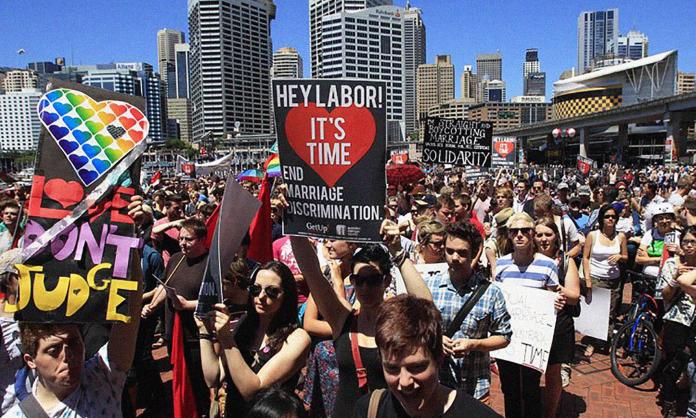In the early hours of Thursday morning, following the shameful passage of the Religious Discrimination Bill through the lower house with ALP support, Labor leader Anthony Albanese tweeted the “breaking” news that Labor had “been successful in protecting LGBTQI school children from discrimination”.
Did they use their numbers—along with the Greens, independents and rogue Liberal MPs—to vote against the government’s religious discrimination bill, a concession to the conservative right after the resounding victory of same-sex marriage in Australia in 2017? No. As Greens MP Adam Bandt said after the vote, every single ALP member supported “Scott Morrison’s hate bill, saying it’s all terrible but then voting it into law”.
Even Labor MP Stephen Jones, whose stirring speech in defence of LGBTI kids went viral in the days leading up to the vote, voted for it. Jones had earlier indicated he supported Labor’s commitment to voting for the bill even if various amendments failed to get up, on the basis that “[Labor] don’t have the numbers to kill it”. This convoluted logic—you vote for the thing you’re against because you don’t have the numbers to stop it—is bad enough. But as it turned out, Labor did have the numbers to block the bill, but just decided not to—turns out they are just as concerned to placate religious bigots as are the Liberals.
And while the party was quick to pat itself on the back for getting behind independent MP Rebekah Sharkie’s amendment to protect trans kids from being expelled from school, what Labor made less of a fuss about was the fact that, behind closed doors, it had used its clout to force Sharkie and the five dissident Liberal MPs to weaken the proposed amendment. The final amendment repealed only sub-section 38(3) of the Sex Discrimination Act, while the initial proposal was to repeal the entire section (which gives broad powers to religious schools to discriminate against students, teachers and contractors).
Labor has always tied itself into knots on the question of LGBTI rights. The party has been happy to put itself at the head of the movement for equality when it’s been popular and politically expedient to do so. Yet at other times, Labor has lined up with some of the most reactionary, conservative forces to oppose LGBTI rights, calculating that the need to win conservative votes is more important than taking a principled stand against LGBTI oppression.
The Religious Discrimination Bill is a case in point. It was the product of the Ruddock Religious Freedom Review—itself a concession to conservatives after the historic “yes” vote for marriage equality. Yet rather than name the review and resulting bill for what it was, the ALP affirmed its support for the bill. The party’s own 2019 autopsy into its election loss of the same year sheds light on their motivation: it found that “particularly devout, first-generation migrant Christians” were moving away from the ALP. For Labor, chasing socially conservative votes is worth the price of throwing the LGBTI community under the bus.
This dynamic was most clearly at work in the thirteen-year struggle for same-sex marriage. Labor supported the then Howard government’s ban on same-sex marriage in 2004. Labor continued to affirm its opposition to same-sex marriage when it took power in 2007. Even when Labor’s Julia Gillard, who was technically on the left of the party, became Australia’s first female prime minister, the party still opposed same-sex marriage. In 2011, Gillard told Sky News that she found herself “on the conservative side in this question [of same-sex marriage]”. She went on to declare “traditional” marriage as possessing a “special status” and being one of “some important things from our past that need to continue to be part of our present and part of our future”.
Indeed, in 2013 when Gillard’s government sought to strengthen the Sex Discrimination Act to better protect women and LGBTI people, her government refused to repeal the homophobic and transphobic section 38.
Perhaps most perversely, openly gay Labor Senator Penny Wong in 2010 expressed her opposition to same-sex marriage and her support for the ALP’s position that there was a cultural, religious and historical view of marriage being between a man and a woman, even when many suspected it was wholly disingenuous.
Only after a campaign lasting more than decade, and victories for marriage equality internationally that made Australia’s ban seem out of step with the norm, did the ALP swing behind the demand. The party later claimed some credit for the victory, despite having spent most of the years leading up to it systematically undermining equality in parliament.
Today, the Labor Party are at it again, congratulating themselves for amending a homophobic and transphobic bill that they had declared themselves willing to support just the day before, and that was still a win for bigotry in its amended form.
We need to remember this the next time Labor paints itself as a friend of the LGBTI community, and not sink into the amnesia Labor relies on to curry support with LGBTI people.








